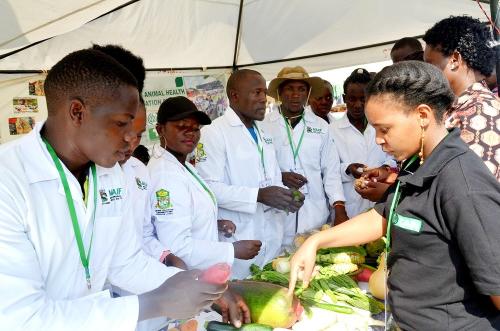

Lilian
Owembabazi,
a research
assistant at
CABI, visits
some young
plant doctors
as part of the
PlantwisePlus
programme to
help farmers
diagnose their
plant health
problems at
the National
Agricultural
Show in Jinja,
Uganda, in 2023
/AGATHA NGOTHO
Unemployed youth are transforming into skilled agri-preneurs and essential service providers.
This is thanks to a unique collaboration between co operative societies and the Centre for Agriculture and Bioscience International (CABI)-led PlantwisePlus programme.
This partnership is not only bridging critical advisory gaps for farmers but also rewriting the future of agricultural extension across the region.
Across Kenya and Uganda, the CABI-led PlantwisePlus programme is turning young people from job seekers into vital service providers, boosting farmer productivity, produce quality and rural livelihoods.
CABI’s medium-term strategy is reducing inequality by creating better opportunities for rural women and youth, while addressing global challenges like hunger, poverty, climate change and biodiversity loss.
According to CABI, the model tackles two major obstacles simultaneously: youth unemployment and limited access to agricultural extension services.
“Despite the urgent need for advisory support in areas such as pest control, pruning and market linkages, many smallholder farmers remain underserved. This service gap often leads to poor yields and lost income, perpetuating cycles of poverty,” CABI notes.
Makueni county and partners are leading the way, and today, Makueni County Fruit Processors Cooperative Society (MCFPC) recruits and links trained youth to farmer groups.
KEITT Exporters Ltd integrates skilled youth into their service delivery chain.
“The youths we onboarded now provide key services like pest diagnosis, pruning and financial literacy to farmers,” said Gertrude Wavinya, MCFPC manager.
KEITT field coordinator Jackline Kioko, added, “The training from CABI was a game-changer. We now have reliable, skilled youth offering quality services like spraying and grafting to our growers.”
Similarly in Uganda, Rubanga Cooperative Society Ltd and ZAABTA Cooperative have adopted and scaled the model.
With over 12 years of youth engagement experience, Rubanga now hosts youth-led plant clinics and connects them with cooperative extension teams and national digital farmer mapping programmes. These young professionals offer a wide range of services, from spraying and diagnostics to operating agro-input outlets. Some have even formed youth councils and received advanced business modeling training.
In Kenya, youth service providers now earn approximately Sh15,000 per month ($115). In Uganda, youth earn about UGX 200,000 monthly ($56), often supported by Sacco loans that help grow their businesses.
Godfrey Mayambala, manager at ZAABTA, noted, “This is true extension. Youth are advising farmers on inputs, herbicides and fertilisers—and the knowledge is spreading. I have seen neighbours teaching neighbours.”
Despite the successes, challenges remain. Transport limitations and delayed or absent farmer payments can disrupt service provision. However, cooperatives in both countries believe these issues are solvable and are calling for expansion.
CABI recommendations include onboarding more youth, formalising service contracts, increasing practical training and mentorship, and using the cooperative model to scale reach and facilitate produce buy-back.
“This model works. Scaling it would increase our impact and help us reach more farmers,” Wavinya said
Instant analysis
This story captures a transformative youth-driven model reshaping agricultural extension in Kenya and Uganda. Through the CABI-led PlantwisePlus programme, unemployed youth are becoming agri-preneurs and service providers, offering vital support in pest control, pruning, financial literacy and input advice. By partnering with cooperatives, the programme addresses twin challenges: youth unemployment and inadequate extension services. The model improves productivity, empowers rural communities and fosters knowledge-sharing. Though limited by transport issues and irregular payments, cooperatives and CABI propose scaling the model through training, contracts, and cooperative networks. It’s a compelling blueprint for sustainable rural development, youth empowerment, and agricultural modernisation across Africa.















